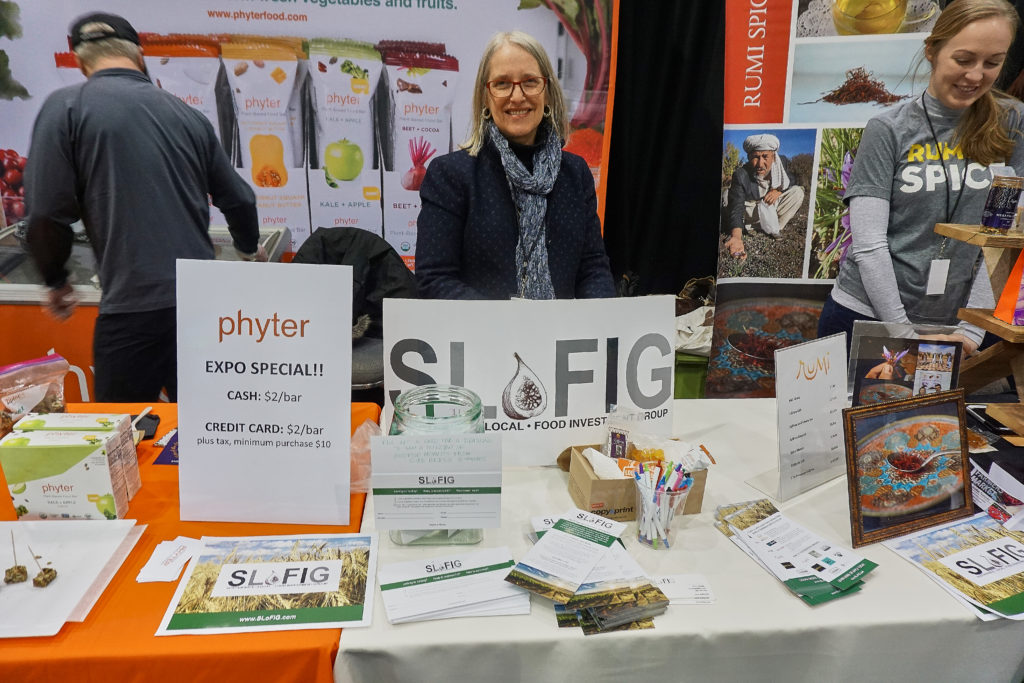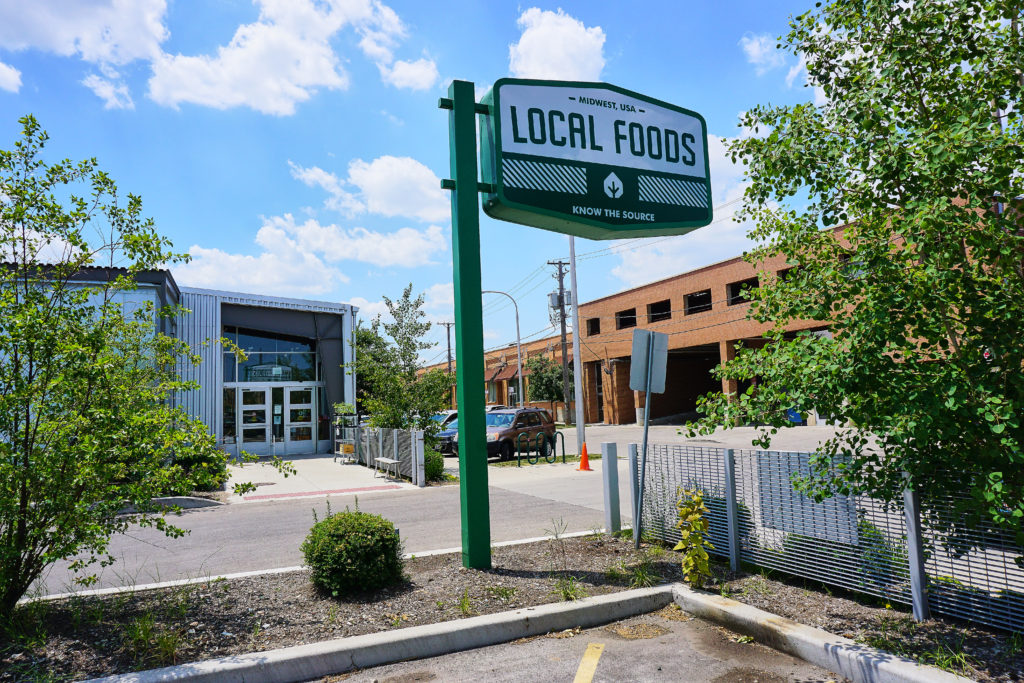by Bob Benenson, FamilyFarmed
The Chicago-based Sustainable Local Food Investment Group, better known as SLoFIG, was one of the first groups focused on making equity deals and loans specifically to Good Food business startups. That underscores just how recently the Good Food sector has been recognized as a promising and profitable place to invest — since SLoFIG itself has been around only since late 2010.
SLoFIG officially launched in March 2011 at FamilyFarmed’s annual Good Food EXPO, and has remained a friend of FamilyFarmed ever since. SLoFIG was an exhibitor at the 2018 Good Food EXPO held in Chicago March 23-24, and will participate in our Good Food Financing & Innovation Conference on Tuesday, June 19 in Chicago, with Lauren Rosenthal — a former FamilyFarmed Board member — representing the group on a panel titled Good Food Is A Good Deal: Investor Insights.
[For more information about the Financing & Innovation Conference and to purchase tickets, visit goodfoodfinancing.org.]
In an interview with FamilyFarmed, SLoFIG co-founder Teri Lowinger discussed SLoFIG’s history, some of its success stories and its investment philosophies.
Lowinger said the seed was planted in 2010 when Karen Lehman, director of the Chicago nonprofit Fresh Taste, “brought a bunch of people together to talk about how to get capital to Good Food businesses.” She added, “The idea was it’s great to have nonprofit money and grants and donations going to Good Food businesses. But if we really want to grow this sector, they’ve got to attract private capital, investment capital, because there’s so much more of that than nonprofit capital.”

Teri Lowinger (center), a co-founder of the Chicago-based Sustainable Local Food Investment Group (SLoFIG), at the group’s exhibit table at FamilyFarmed’s 2018 Good Food EXPO. She was flanked by two rising Good Food startups, Phyter snack and energy bars and Rumi Spice saffron, whose investments from SLoFIG were championed by Lowinger. Photo: Bob Benenson/FamilyFarmed
SLoFIG founders initially explored working with banks on potential partnerships, but Lowinger said she had an eye-opening experience when she attended a meeting of Hyde Park Angels, a member-led angel investor group loosely affiliated with the University of Chicago. “I did think that was a really easy way to get money to the Good Food world,” Lowinger said. “And the nice thing about that model is that the group as a whole works together to collaborate and share the members’ experiences and skills to analyze businesses, to help businesses, and the decision is up to each member whether or not to invest.”
Lowinger said the process of making investments begins with a committee of SLoFIG’s members who screen applicants. There are two key criteria. First, it must be a Good Food company, “something we would consider good healthy food and an alternative to the current food system.” Second, this is an investment group, so “we also make sure it’s a viable business prospect, and investors will have a good chance of getting our money back with a return.”
Even if those criteria are met, a SLoFIG investment is not guaranteed. The next crucial step is for one of SLoFIG’s members to step forward to advocate for the applicant. “The only way a business is going to succeed with us is if one of our members gets really excited about it and will act as the deal lead,” Lowinger said. “They’re the ones who communicate with the company, they lead the due diligence process, they lead the negotiation to see if we can come up with the transaction with the company, and they round up other FIGs to join in the investment.”
SLoFIG’s first two investments in late 2011 were to Nellcote and RM Champagne Salon, adjoining restaurants on the West Loop’s burgeoning Restaurant Row that were launched by a team including Chicago Chef Jared Van Camp . Those restaurants are still going strong, but the group learned two things since that time. One is that SLoFIG members do not want to emphasize restaurants, which tend to be risky financial propositions. The other is that the group prefers to not be a passive investors.

Sugar Beet Co-op, located at street level in a renovated, architecturally significant building in the Chicago suburb of Oak Park, was an early project in which SLoFIG investors were actively engaged in the planning process. The photo was taken in 2015, the year the co-op store opened. Photo: Bob Benenson/FamilyFarmed
A turning point soon came when SLoFIG became involved in the developing Sugar Beet Co-op store in Oak Park, a suburb on Chicago’s western border. Several of SLoFIG’s members were residents of that area and were enthusiastic advocates for Sugar Beet. As a result, SLoFIG became closely involved in the planning for the co-op market, which opened to popular acclaim in August 2015.
“We realized at that point, when we were not passive investors but were a bigger portion of the raise and more actively involved, that’s when we could add value to the company besides just giving them money…,” Lowinger said. “We were completely behind the company not only financially but emotionally and professionally. Everyone was pulling, trying to help them succeed.”
SLoFIG also has invested in the developing Chicago Market co-op — which recently announced it will locate in a historic building in the center of Uptown, an economically challenged community on the city’s North Side — and Local Foods, a retailer and distributor of sustainably produced food, most of it from the Midwest region.

Local Foods Grocer and Distributor, located in Chicago’s Bucktown neighborhood, was the recipient of an early SLoFIG investment. Photos: Bob Benenson/FamilyFarmed
Several of SLoFIG’s investments, though, have been in consumer packaged goods (CPG) companies. And when Lowinger staffed the SLoFIG table at FamilyFarmed’s Good Food EXPO in March, she was flanked by two companies that received investments after she advocated on their behalf as deal lead: Rumi Spice, founded by young Army veterans of the war in Afghanistan, which sells saffron produced from flowers grown by Afghan farmers (as an alternative to opium poppies), and Phyter, which produces fresh, refrigerated snack and energy bars.
While the story of Rumi Spice’s social mission is compelling and it is headquartered in Chicago, there was some disagreement among SLoFIG’s members about whether it was an appropriate investment for a group that has “Local” in its name. “Several people said, ‘We’re supporting Afghan farmers, we’re not going to be growing saffron in Illinois and Wisconsin, is this really a local food company?’” Lowinger said.
But Lowinger, emphasizing that she was speaking for herself, described her philosophy about local: “My philosophy is I’m going to eat a plate of food and it’s going to have some coffee, it’s going to have some wine, it’s going to have some spices. Everything I can get locally, I’ll get locally. If it’s not going to be a local product though, I’d rather support a local company and I’d like to support producers who are doing it the right way, at least what I consider the right way.”
As for Phyter, part of the attraction for Lowinger is that their bars appeal to her as a vegetarian. “I like Phyter because first of all, I think the bars taste really good,” Lowinger said. “If you look at most [snack and energy] bars, it’s the same grain, fruit, seed, nut combo in various recipes. This was the only bar that had vegetables as one of the primary ingredients. So for a vegetarian, it’s really a balanced meal.”
Circling back to the group’s name, we asked where it came from. Lowinger laughed. “Originally it was Soon-To-Be-Named Local Food Investment Group,” Lowinger said. “We liked SLoFIG. We struggled for some time brainstorming about how we could keep the acronym and have it make sense as a name… We think it fits.”
